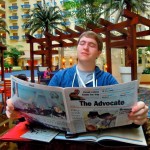The woman who knows “How the World Began”
Playwright Catherine Trieschmann, in town for opening night, spoke to TCD about the play's origins and writing from Kansas.
 Tonight, the Milwaukee Rep opens How the World Began, a play about a Kansas schoolteacher from out of town who accidentally stirs up a conflict over evolution vs. creationism with an offhand remark in the classroom, which sets her in opposition to a student and his temporary guardian. Among the audience members will be Catherine Trieschmann, the play’s author and a Kansas resident originally out of town herself. She’s only blowing through Milwaukee for the day, but TCD writer Matthew Reddin sat down with her Friday morning to talk about her history, the play itself, and the difference of opinion at its heart, only a single example of the political and social issues which can divide us – should we be as unwilling to recognize our own prejudices as her characters can be.
Tonight, the Milwaukee Rep opens How the World Began, a play about a Kansas schoolteacher from out of town who accidentally stirs up a conflict over evolution vs. creationism with an offhand remark in the classroom, which sets her in opposition to a student and his temporary guardian. Among the audience members will be Catherine Trieschmann, the play’s author and a Kansas resident originally out of town herself. She’s only blowing through Milwaukee for the day, but TCD writer Matthew Reddin sat down with her Friday morning to talk about her history, the play itself, and the difference of opinion at its heart, only a single example of the political and social issues which can divide us – should we be as unwilling to recognize our own prejudices as her characters can be.
Matthew Reddin: Tell me a little bit about yourself. How did you get into playwriting?
Catherine Trieschmann: Actually, I have a good Milwaukee tie-in to how I got started – I was very much into acting in college [at the University of North Carolina] and I took a playwriting class. And my first assignment, I brought in my scene, and this fellow next to me – Dan Kois – who never hedged on giving his opinions grabbed the scene out of my hands, read it and pronounced to the teacher that it was actually good, and that we should begin with it. Now, the kicker of this story is that Dan Kois is a senior editor at Slate, he just wrote an amazing article about doing karaoke for New York magazine, he started Vulture at New York magazine – he’s a really-big-deal arts journalist. And he’s from Milwaukee.
MR: Oh? I did not know that, actually.
CT: Yep, he grew up in Milwaukee, and the Rep was very formative to him in terms of coming of age and being interested in theater. He’s a very good friend and has read every single play I’ve ever written. He’s still my first and best reader. But it just goes to show you never know how important regional theaters are for the formation of young artists.
MR: So, tell me about your play, How the World Began.
CT: It was commissioned by the Manhattan Theatre Club through the Sloan Foundation, which is a foundation dedicated to – well, I’m sure they do lots of things, but among some of the things they do is to encourage playwrights to write plays about science. The Pulitzer Prize-winning play Proof was a Sloan Foundation play; that’s the most famous one.
So I had to write a play about science. Which was a little tricky for me, because that’s not particularly my forte, but my husband teaches philosophy of science, which is very interesting and involves less math. When we moved to Kansas – we moved there because of his job – he was always asked to be on panels about creationism versus evolution, because it’s still a big issue in Kansas. I grew up in the South so it’s not as though these conversations were completely alien to me, but they weren’t front and center. Not like this. And so I was just astounded by the passion with which people came to the table over this issue in Kansas. So that, paired with the fact that Greensburg, Kansas, which is a little town an hour and a half south of us, was completely destroyed by a tornado – it was very close to home, to observe that sort of natural disaster. And so the combination of those two things really was the building blocks of this play.
CT: Six years.
MR: And have you been able to discern why the creationism/evolution debate is still a big issue there?
CT: Kansas remains a bit of a mystery to me, I have to say. It’s really fascinating. It’s deeply conservative, but it’s a different conservatism than the South. There’s a big impulse for people to be left alone. And in some ways – and this sounds odd – but very free-thinking, in a way. There’s a sense of people not wanting to be told what to do, and to be allowed to come to their own philosophies and beliefs about things.
MR: Did you find it difficult to write viewpoints you don’t necessarily agree with in this play?
CT: Actually, none of the characters in the play are my position. I mean, all of them have a little of me, but none of them represent my viewpoint. And I think that’s always the case. I don’t know that I’ve ever written a character that was “Catherine Trieschmann’s View of the World.”
MR: What’s the experience of being a playwright who lives in Kansas, versus New York or Los Angeles or even Milwaukee?
CT: I feel like it’s a mixed bag. On the one hand it’s lonely, and I really wish that I had a writer’s group. Often there are directors that I want to meet that I just have to wait for my yearly trip to New York to meet with. Also, I don’t get to see a lot of theater – of course when I travel I do, and I read scripts voraciously, but I don’t get to see as much as I once did, so that’s sad.
But on the other hand, it’s so cheap, I can just live off my income as a playwright. And it’s a very low-pace life – I can walk with my kids to school, and there’s nothing to do in town, there’s no shopping. I have Internet, I don’t have cable or a smartphone. It’s less stressful and it’s very peaceful and I think that’s good for my writing.
MR: What do you want audiences to take away from the play?
CT: It’s not as though I want people to give up their acceptance of the theory of evolution or their belief in God as the creator of the Earth. It’s more that I want people to be provoked to look at how they view people with opinions different from their own. It’s about trying to open us up to our own prejudices. One thing that I really hope about the play is that people identify and sympathize with characters who they don’t agree with.
And I’ll also say one more thing: I think that when people are disappointed in the play, it’s in part because they have this vision of Inherit the Wind in mind that’s about great oratorical debate. Which this play is not at all. In fact, this play is about how we fumble for words and how we usually don’t make good arguments and how often we turn an issue into a personal attack instead of sitting down and having a reasoned, rational argument. And that’s purposeful.
Theater
-
Oh, Those Witty 18th Century Brits
 Nov 24th, 2025 by Dominique Paul Noth
Nov 24th, 2025 by Dominique Paul Noth
-
Skylight’s Holiday Show Is Lots of Fun
 Nov 16th, 2025 by Dominique Paul Noth
Nov 16th, 2025 by Dominique Paul Noth
-
Rep’s ‘Come From Away’ Is a Triumph
 Nov 10th, 2025 by Dominique Paul Noth
Nov 10th, 2025 by Dominique Paul Noth



















